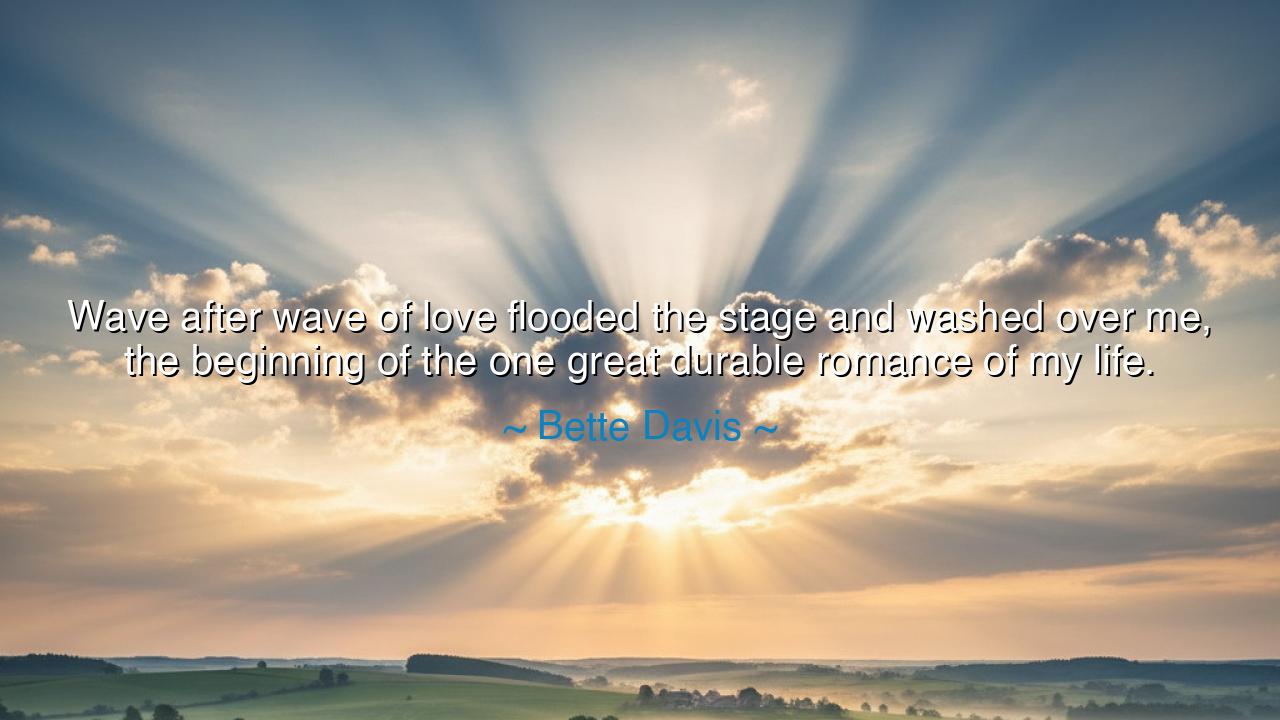
Wave after wave of love flooded the stage and washed over me, the
Wave after wave of love flooded the stage and washed over me, the beginning of the one great durable romance of my life.






The words of Bette Davis flow like a tide upon the soul: “Wave after wave of love flooded the stage and washed over me, the beginning of the one great durable romance of my life.” In this confession, she reveals not the fleeting infatuations of human love, but the deeper bond she found in her art, in the communion between actress and audience. For some, love is bound in the face of another; for her, it was discovered upon the stage, where passion, devotion, and identity merged into one enduring flame.
Here, love is not narrowed to the personal but expanded to the universal. Davis speaks of her relationship with the stage as the true and lasting romance of her life. Many loves fade, many bonds break, but the love of a calling, the love of a craft, can endure to the end of days. She paints this truth with imagery of the sea: wave after wave, overwhelming, irresistible, cleansing her in its power. It is the ancient language of passion, describing not just admiration but surrender to a force greater than herself.
The ancients would have nodded at these words, for they too knew that love comes in many forms. They told of warriors bound to their gods, of poets bound to the muse, of statesmen bound to the service of their people. To such souls, devotion to a cause or craft was not less than romance, but the purest kind of it—durable, enduring beyond the fickleness of human passion. In Bette Davis’s case, the romance of the stage was as consuming as any embrace, as eternal as any vow.
Consider the story of Michelangelo, who gave his life not to another, but to his art. Though offered comfort and wealth, he often lived in hardship, carving, painting, and striving with relentless devotion. He too could have said, “Wave after wave of love flooded me,” as he looked upon marble yielding to his chisel, or the Sistine Chapel ceiling bearing the fruit of his soul. His romance was not with flesh and blood, but with creation itself—and it endured beyond his own lifetime.
Yet Davis’s words are not cold or distant; they are filled with warmth, for she speaks of love flooding her, washing over her, coming not only from her art but from those who witnessed it. The bond between performer and audience is itself a romance, a shared ecstasy where one offers and the other receives, until both are transformed. This is not unlike the bond between lovers: giving, receiving, returning, until each is lost in the other.
The lesson here is profound: do not limit your understanding of romance to the narrow confines of human relationship. Seek also the romance of purpose, the romance of calling, the romance of something greater than yourself. When you find it, it will flood your soul with waves of love, and it will be durable—lasting when other loves fail.
Therefore, let all who hear take action: find that one pursuit, that one devotion, that fills your days with meaning and your nights with light. Do not be ashamed if your truest romance is with your craft, your cause, or your art. Honor it, nurture it, let it carry you beyond the ordinary into the eternal. For the ancients teach us, and Davis reminds us, that love takes many forms—but the most lasting are those which bind us to our destiny.
Thus her words endure, like the echo of applause in an empty hall: romance is not only found in the arms of another, but in the passion that floods your being when you walk the path you were born to walk. Seek such a romance, and you will find a love that time itself cannot erode.






AAdministratorAdministrator
Welcome, honored guests. Please leave a comment, we will respond soon